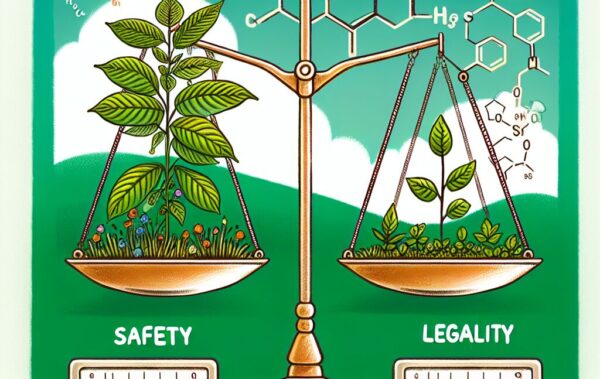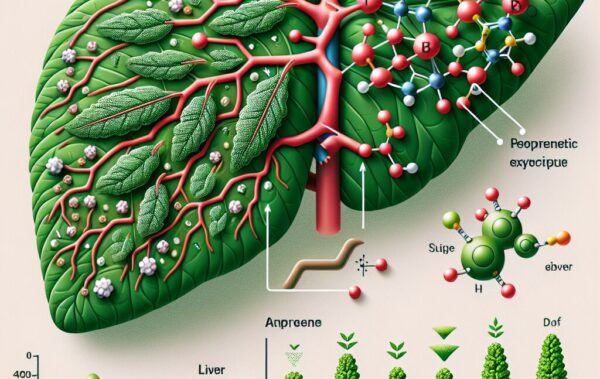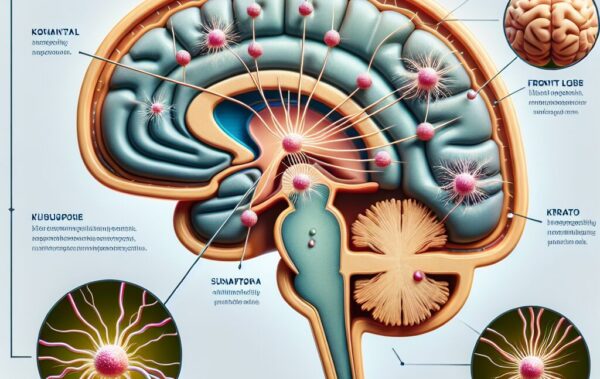- Background and properties of Kratom
- Kratom’s effects on blood sugar levels
- Potential benefits of Kratom for diabetic patients
- Safety considerations and future research directions
Kratom, a tropical evergreen tree scientifically known as Mitragyna speciosa, has been creating ripples in the health and wellness industry for its unique properties and potential therapeutic benefits. Originating from the lush forests of Southeast Asia, the leaves of this plant have been traditionally used for centuries by local populations for their stimulant and sedative effects. In recent years, its popularity has surged in the Western world, where it’s often consumed in the form of powders, capsules, teas, or extracts.
The active compounds found in Kratom leaves, primarily mitragynine, and 7-hydroxymitragynine, interact with opioid receptors in the brain, which may produce sedation, pleasure, and decreased pain, much like opioids. However, Kratom’s interaction with these receptors is believed to be more selective, leading to the hypothesis that it might offer some of the pain-relieving benefits of opioids with fewer risks. It’s essential to recognize that despite its potential, Kratom is a complex plant, with over twenty-five alkaloids identified in its chemical profile, each with varying effects on the body.
When discussing Diabetes Management, the importance of maintaining healthy blood sugar levels cannot be overstated. It is crucial to explore all avenues of management, including traditional medications, lifestyle changes, and potential herbal therapies. In this context, the prospect of using Kratom for Blood Sugar Control has piqued the interest of many researchers and individuals living with diabetes. Speculation around Kratom’s potential benefits in this realm stems from anecdotal reports and its use in traditional medicine practices where it has been prescribed for a myriad of health issues.
The properties of Kratom could be directly or indirectly beneficial in managing diabetic symptoms. For instance, its purported effects on alleviating pain may be of particular value in addressing diabetic neuropathy, a painful condition caused by high blood sugar injuring nerves throughout the body. Alongside pain management, the mood-elevating and energy-boosting effects of Kratom may assist individuals in achieving a more active lifestyle, which is a cornerstone in diabetes management.
Despite the intrigue surrounding Kratom’s use in diabetes management, the scientific literature remains scant, warranting cautious optimism. Future pharmacological studies are needed to explore the compound’s mechanism on blood sugar levels and overall metabolism. As with any herbal therapy, consumption of Kratom must be approached with prudence.
- The botanical taxonomy of Kratom
- The primary alkaloid components, mitragynine, and 7-hydroxymitragynine
- The traditional uses of Kratom in Southeast Asia
- The surge of interest in Western cultures for various ailments
- The potential for Kratom in holistic Diabetes Management strategies
- The need for comprehensive research on Kratom’s effect on Blood Sugar Control
To further our understanding of Kratom, it’s imperative that we continue to examine its pharmacodynamics, its impact on glucose metabolism, and its long-term effects on the body. The holistic approach to diabetes care emphasizes the need for comprehensive treatment plans that cater to the multifaceted nature of the disease. In such an approach, Kratom could, potentially, find its place as a supplementary aid. It’s equally important to balance enthusiasm with caution, acknowledging that while there are promising tales of its efficacy, unverified claims can not replace evidence-based therapy. Science-backed research would help distinguish between anecdotal evidence and verified facts, clarifying the role of Kratom in diabetes management.
| Kratom Component | Potential Therapeutic Effect |
|---|---|
| Mitragynine | Pain relief, mood elevation |
| 7-hydroxymitragynine | Sedative, analgesic properties |
| Additional Alkaloids | Various effects including anti-inflammatory |
In conclusion, while it is not a panacea, Kratom presents an interesting topic within holistic and herbal therapy discussions for diabetes management. Its diverse properties can potentially aid in various aspects of managing the condition. But, as with any alternative therapy, it is imperative to practice consumption safely, be aware of legal restrictions, and seek advice from healthcare professionals. For those interested in exploring this option, responsible vendors provide a wide array of Kratom products, such as powders and capsules, to suit different preferences and needs, always remembering that quality and purity are paramount when it comes to herbal supplements.
Kratom’s effects on blood sugar levels
In light of growing interest in alternative therapies, the discussion on Kratom’s effects on blood sugar levels is particularly compelling. Diabetes Management requires careful monitoring and control of glucose to prevent the long-term complications of diabetes, and this is where the potential use of Kratom as a supplement to traditional treatments garners attention. Yet, it’s important to dissect these possibilities with a blend of scientific curiosity and a healthy dose of skepticism.
Understanding the interplay between Kratom and blood glucose levels is necessary as this could illuminate potential avenues for Herbal Therapy in managing diabetic symptoms. First, we consider the reported benefits of Kratom, such as stress reduction and improved energy. Stress is a well-known factor that can exacerbate blood sugar fluctuations, and managing it can be beneficial for stabilizing glucose levels. Additionally, increased energy could translate into greater physical activity, which is a critical factor in Diabetes Management.
There are anecdotal reports among users of Kratom suggesting a possible stabilizing effect on blood sugar levels. While these subjective experiences are far from clinical evidence, they do pose an intriguing question: Could the alkaloids in Kratom influence metabolic processes linked with glucose control? It’s hypothesized that if Kratom can promote a balance in energy levels and help manage the stress response, these effects might indirectly contribute to better Blood Sugar Control. Still, these hypotheses must be rigorously tested in a research setting to ascertain their validity.
At this point, some of the key areas that require further investigation include:
- The impact of Kratom on insulin sensitivity
- The effects of Kratom on weight management and its correlation with blood sugar levels
- The influence of Kratom’s active compounds on appetite and food intake
The possibility that Kratom could aid in weight management is particularly worth exploring. Excess weight is a significant risk factor for type 2 diabetes, and if Kratom possesses appetite-suppressing properties, it could support dietary interventions aimed at weight loss and maintenance. In such a case, products like Kratom capsules could provide a convenient and controlled means for consumption.
| Research Focus Area | Kratom’s Potential Impact |
|---|---|
| Insulin Sensitivity | Improvement, leading to better glucose uptake |
| Weight Management | Contribution to weight loss/regulation |
| Appetite Suppression | Reduced calorie intake, aiding in blood sugar regulation |
Continuing our critical examination, we also have to place importance on responsible use and the recognition of potential side effects. Unmoderated or improper use of Kratom, like that of any supplemental therapy, could lead to adverse reactions, some of which may have an undesirable impact on blood sugar levels. To ensure safe use and avoid potential contraindications, it’s essential to consult with a healthcare provider before integrating Kratom into a Diabetes Management routine.
In relation to safety, there is also the aspect of product quality. The market for herbal products often varies in the purity and concentration of the active compounds. Consumers looking to try Kratom must prioritize sourcing from reputable vendors. Websites like Kratom.Markets provide an aggregation of products, making it easier for individuals to find high-quality Kratom options from various brands and ensure what they are receiving is of pure and controlled quality.
As we bridge the preliminary findings with more comprehensive research, the future directions of this exploration continue to be drawn out. The current gaps in knowledge surrounding Kratom’s direct effects on blood glucose necessitate controlled clinical studies. Such research must not only delineate the potential benefits but also identify risks, appropriate dosages, and long-term impact of Kratom use for individuals with diabetes.
Through cautious investigation and collaboration with healthcare providers and researchers, the full picture of Kratom’s role in Blood Sugar Control and Diabetes Management will become clearer. This evidence-based approach will allow individuals living with diabetes to make informed decisions about incorporating Kratom into their Diabetes Management plan, raising important questions and perhaps offering a window into new Herbal Therapy modalities.
Potential benefits of Kratom for diabetic patients
 The world of diabetes management is one that requires constant vigilance and an openness to explore various therapeutic options. Within this realm, Kratom has emerged as a topic of conversation, particularly among those looking for alternative strategies to supplement their diabetes care. The potential benefits of Kratom for diabetic patients revolve largely around its traditional use for pain relief and the alleviation of various conditions, including those associated with diabetes.
The world of diabetes management is one that requires constant vigilance and an openness to explore various therapeutic options. Within this realm, Kratom has emerged as a topic of conversation, particularly among those looking for alternative strategies to supplement their diabetes care. The potential benefits of Kratom for diabetic patients revolve largely around its traditional use for pain relief and the alleviation of various conditions, including those associated with diabetes.
One of the noteworthy possibilities is Kratom’s potential in addressing not only the physical but also the psychological aspects of diabetes care. Depression and mood disorders are commonly reported among individuals with chronic illnesses such as diabetes. The mood-enhancing effects of certain strains of Kratom could, hypothetically, provide an uplift in mood, which may be beneficial for a patient’s overall mental well-being and their ability to manage diabetes.
As any expert will tell you, diabetes management is not solely about controlling blood sugar levels, but also about maintaining a healthy lifestyle. The stimulant properties of Kratom might encourage increased physical activity—considered a cornerstone of effective diabetes treatment. This could help in regulating blood glucose levels, improving cardiovascular health, and potentially contributing to weight loss, which is often recommended for type 2 diabetes patients.
We also cannot overlook Kratom’s analgesic properties. Diabetic neuropathy—nerve damage resulting from high blood sugar—can cause severe pain, making everyday tasks challenging for patients. Anecdotal evidence suggests that Kratom could offer some relief, helping to manage this painful condition without the heavy reliance on traditional opioids, which come with their own risks and side effects.
Additionally, there is the potential for Kratom to impact insulin sensitivity and secretion. While current research is limited, exploring how the active compounds within Kratom influence pancreatic function could yield valuable insights. If Kratom improves insulin sensitivity, it may help diabetic patients achieve better blood sugar control with less medication, although this needs to be thoroughly vetted by rigorous clinical research before being recommended.
Let’s delve into a few detailed key points:
- Kratom’s potential for mood improvement and stress alleviation, contributing to mental health in diabetic care.
- The ability of Kratom to encourage physical activity through its stimulant effects.
- The analgesic properties of Kratom may provide relief from diabetic neuropathy pain.
- The hypothetical influence of Kratom on insulin sensitivity and secretion.
It’s paramount, however, to approach these potential benefits with a careful, research-based attitude. And for those considering Kratom, it is essential to remember that the legality and acceptance of Kratom vary widely around the world, and it is not approved by many health authorities for medical use.
| Potential Benefit | Implication for Diabetes Management |
|---|---|
| Mental health support | May assist in the psychological challenges associated with chronic management of diabetes. |
| Encouragement of physical activity | Could help regulate blood glucose levels and facilitate weight management. |
| Pain relief | May provide an alternative treatment option for neuropathic pain. |
| Insulin Sensitivity | Potential for better Blood Sugar Control. |
For those willing to explore this option, it’s crucial to obtain Kratom from trusted sources. Websites like Kratom.Markets can provide access to high-quality Kratom products, ensuring that what’s consumed is pure and reliable. It might be especially beneficial for patients to look towards products like Kratom capsules which can provide a precise dosage, aiding in safe consumption patterns.
In wrapping up this section, while we recognize the speculative nature of Kratom’s benefits in diabetes management, it is clear that the plant holds a certain allure within the conversation of Herbal Therapy. Its multifaceted effects—ranging from pain relief to potential influences on mood and physical activity levels—render it an area worthy of more in-depth scientific scrutiny. As advocates for holistic health approaches, we champion the call for more research in this area, with the hope that Kratom could one day become a valid adjunct in the holistic toolbox for Blood Sugar Control and Diabetes Management.
Safety considerations and future research directions
As we dive into the realm of safety considerations regarding Kratom use, particularly in the context of Diabetes Management, it is essential to tread with both interest and caution. While the potential benefits of Kratom for Blood Sugar Control and as part of a broader Herbal Therapy strategy are intriguing, safety is a paramount concern that must be addressed.
Kratom is not regulated by the FDA, and its legal status varies between different jurisdictions, with some classifying it alongside controlled substances. This ambiguous legal landscape challenges both consumers and healthcare providers to navigate its use responsibly, emphasizing the need for due diligence when considering Kratom as part of Diabetes Management.
Safety concerns arise due to several factors associated with Kratom consumption. These include potential interactions with prescription medications, effects on organ systems such as the liver and the cardiovascular system, as well as the risk of dependency and withdrawal. It is crucial for individuals to consult with healthcare professionals before using Kratom, ensuring that it does not interfere with existing health conditions or treatments.
When discussing future research directions, the need for stringent clinical trials cannot be overstated. Science needs to dissect the precise pharmacological effects of Kratom and appropriately evaluate both its therapeutic potential and risks. There is a goldmine of anecdotal evidence and traditional use that hints at Kratom’s possible benefits, but empirical data from randomized, controlled studies are still lacking.
The following key points highlight the safety considerations as well as the research needs:
- Understanding the risk of dependency and mapping out withdrawal symptoms.
- Examining the long-term effects of Kratom use on organ systems.
- Determining safe dosage guidelines to minimize adverse effects.
- In-depth evaluation of drug-herb interactions, especially important for individuals on diabetes medication.
It’s also worth noting that standardized protocols for quality assurance are scarce, leading to variability in product potency and purity. Reputable vendors, such as those featured on Kratom.Markets, are essential to ensure consumers have access to high-quality products. Responsible vendors ensure their Kratom products, whether it be powder, capsules, or extracts, are subject to third-party testing for contaminants and alkaloid content, providing a safer consumer experience.
| Safety Consideration | Implication |
|---|---|
| Legal Status and Regulation | Users must be aware of the legalities in their location and monitor changes in legislation. |
| Drug Interactions | Potential for adverse effects when combined with diabetes or other medications. |
| Dependency Risk | Need for awareness and monitoring for abuse potential. |
| Quality Assurance | Importance of sourcing from reputable vendors to ensure product safety. |
The future research directions for Kratom in Diabetes Management should include extensive pharmacokinetic studies, dose-response relationships, and long-term safety evaluations. Equally important is the investigation into the effectiveness of Kratom as a holistic treatment option, particularly its role in glycemic control and the management of diabetes-related complications.
As the dialogue on Kratom’s utility in managing diabetic symptoms continues, researchers, healthcare providers, and patients alike must collaborate to ensure that the potential therapeutic benefits are leveraged safely and effectively. Only with such comprehensive and discerning research efforts can we determine the rightful place of Kratom within the practice of Herbal Therapy for Diabetes Management.









